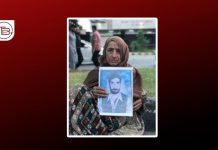Balochistan, one of the poorest regions of the South Asia with a 24% female and 56% male literacy rate, has an abysmal educational apparatus. The coronavirus pandemic raging across the globe is disrupting the education system of Balochistan as well: private and government schools, colleges and universities are being closed and examinations deferred. Public libraries are being closed, and majority of the students in the poorest regions of Balochistan are left without any access to books and education. In a situation like this, the mobile library services are a lifeline for the poor students of Balochsitan.
When the schools were closed throughout Balochsitan at the start of the Covid-19 pandemic in 2020, two women in Mand – Zubaida Jalal, a federal minister in the Pakistani government, and her sister Rahima Jalal, headteacher of a local high school – came up with the idea of setting up a mobile library on top of a camel. This camel would travel across various town in the region and distribute books to the children.
“Actually, the idea of using camels comes from Mongolia and Ethiopia”, Rahima told journalist Shah Meer Baloch. “It suits our desolate, distant and rough terrains. We have received an enormous response that we were not expecting.”
Roshan – the camel carrying the library – visits four villages and stays at the house of “mobiliser” during the visits. The local children gather in the house where they borrow, read and exchange books with the camel and each other. The books are donated by Alif Laila Book Bus Society based in Lahore, which operates rickshaw libraries in the city.
“Kids are eagerly waiting; they want to read books and keep asking me [about it]. There should be more science-related books so our kids can learn by experimentation”, one woman in Mand related.
According the the report published in The Guardian The Jalal sisters said that the scheme has garnered attention and excitement in other areas as well. They have just started a similar mobile library in Gwadar – the coastal city bordering the Arabian sea – with a camel called Chirag. Chirag visits five towns a week with it handler and a local teacher named Ismail Yaqoob.
Yaqoob said that whenever he misses his rounds with the Chirag the camel, young students from different towns call him to question his absence. “Children are so interested in reading and in their studies, but sadly the state does not invest in education.”
Despite the ubiquitous poverty and the government’s negligence towards education in Balochistan, the students here are heavily invested in book reading. Government libraries are a rarity in the region and a few that are functioning are underequipped and located only in the major cities of Balochistan, like Quetta and Khuzdar. In small towns and villages, book shops do not exist, leaving the students with no access to these resources.
In many areas of Balochsitan, local student organizations have taken it to themselves to build libraries and provide books for their fellow students. In Wadh, for example, a group of five friends built a functioning and well-furnished library in a former drug den. The district authorities only provided the decrepit building – the students had to raise funds to repair and paint the edifice, build shelves and buy books to fill them up. Their efforts got the attention of world renowned Brazilian author Paulo Coelho, who tweeted: “Send books to Balochistan, they’re building reading rooms.”
Similar initiatives have followed suit in other areas as well. In Gwadar, the locals have set up a fully functional library in a container on the beach. The library can accommodate ten people at a time. Furthermore, they also organize events and gatherings on the picturesque beach to further encourage the local students into book reading. Student organisations have also set up books stalls in literary festivals throughout Balochistan where they provide books on affordable prices.
Related: Civilians take it to themselves to repair roads and build schools
The student organizations also provide an easy access to numerous of books to the students. Each organization has its own library, containing hundreds of books from various genres. Due to such initiatives, authors that were hitherto unheard of in Balochistan are now well known and read.






























